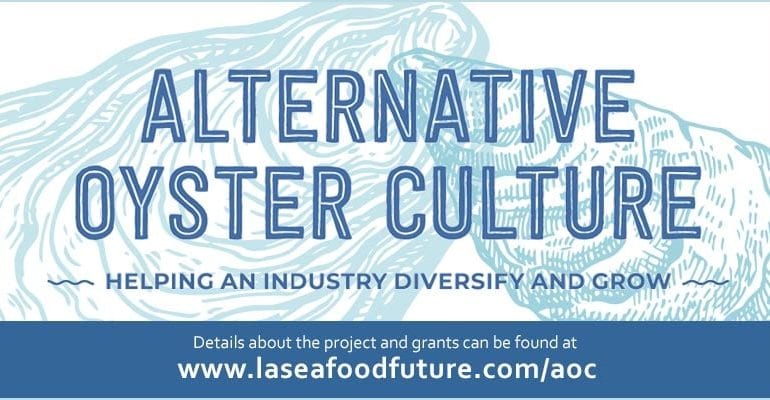Louisiana Sea Grant (LSG) has received a $3 million grant from the Louisiana Department of Wildlife and Fisheries (LDWF) and the Coastal Protection and Restoration Authority (CPRA) to expand alternative oyster culture (AOC) throughout the coast.
AOC – also known as alternative oyster culture – is when oysters are grown in floating cages or in bottom-placed cages attached to pylons. This method allows the cages to be raised and lowered to protect oysters from predators, fouling and the burial effects of disasters like hurricanes. LSG has operated an AOC demonstration farm on Grand Isle for more than a decade and began researching alternative oyster culture in the late 1980s.
The goal of the project is to begin expanding AOC operations across the state within three years. That includes establishing AOC seed nurseries and grow-out facilities, hatcheries and areas legally designated as AOC Management Units (parks) that contain multiple farms in one location.
“Our objective is to supply AOC operators with the necessary resources like education, business tools, equipment and public outreach to increase their chances of success,” said Thomas Hymel, LSG and LSU AgCenter Extension agent who is serving as the project lead. “Alternative oyster culture was identified as an important adaptation strategy by people in the oyster industry during Louisiana’s Seafood Future workshops and surveys. This grant is in direct response to industry suggestion; offering direct economic development assistance.”
One aspect of the project is $1.8 million in grants that AOC operators can apply for to purchase equipment and supplies to enhance existing businesses or establish new AOC businesses. Grant categories include oyster parks, seed nurseries, grow-out farms and hatcheries. Applicants would be required to meet a number of eligibility requirements, such as possessing a Louisiana oyster harvester license and commercial fishing license, be a resident of the state and not have been convicted of a Class 4 or greater oyster-related violation. Grants also are contingent on the availability of funds.
Grant recipients will have to develop their businesses according to an established timeline, periodically report on how the grant contract is being fulfilled in a timely fashion and demonstrate that a marketable oyster product is being grown and cultivated. An extension of the timeline could be approved for things such as bad weather and equipment purchase backlogs.
“AOC isn’t a replacement for the traditional oyster fishery,” said Earl Melancon, who leads the team with Hymel on the project and who is a now a LSG Scholar and formerly a Nicholls State University professor emeritus with 45 years of working with the oyster industry, “It’s a supplement for those fishers who have an interest in developing a new method of bringing a valuable Louisiana product to market.”
Added Hymel, “For an alternative oyster culture operation to be a successful business, it’s necessary that their marketing strategies portray the product as a boutique-style of oyster – which it is – and that the branding and marketing doesn’t negatively impact our traditional oyster fishery.”
Hymel and Melancon acknowledge that such a large and complex project requires a professional team with diverse expertise. Key personnel contributing to the project include Brian Callam (LSG oyster specialist and oyster hatchery director), Rusty Gaudé (LSG/LSU AgCenter marine extension agent), Jim Wilkins (LSG Law & Policy Program director), Julie Lively (LSG/LSU AgCenter fisheries specialist) and Evelyn Watts (LSG/LSU AgCenter seafood extension specialist).
“Once the AOC program is up and running, we as a team know that there will be questions from industry and the general public,” said Melancon. “We plan to hold a virtual public meeting via Zoom in the coming weeks to explain the program, and to hear and answer as many questions as possible.”
“This program comes at a critical moment for the industry,” said Callam. “Current AOC farmers have been hit extremely hard in recent years by both the multitude of storms battering the coast, causing many farmers to lose most of their oysters and equipment, and the pandemic that has made selling oysters almost an impossibility. There has also been increasing interest from the oyster industry to diversify the production of the oysters they cultivate, so having a program that offers grant support and the diverse expertise to assist in its implementation should go a long way.”
A question and answer Zoom meeting will take place on Wednesday, May 19 at 6 pm. To register, visit https://lsu.qualtrics.com/jfe/form/SV_6xSAI5boekHhO4u.
Details about the project and grants can be found at www.LaSeafoodFuture.com/aoc.
Since its establishment in 1968, Louisiana Sea Grant (www.laseagrant.org) has worked to promote stewardship of the state’s coastal resources through a combination of research, education and outreach programs critical to the cultural, economic and environmental health of Louisiana’s coastal zone. Louisiana Sea Grant, based at LSU, is part of the National Sea Grant College Program, a network of 34 university-based programs in each of the U.S. coastal and Great Lakes states and Puerto Rico.





